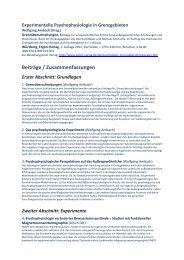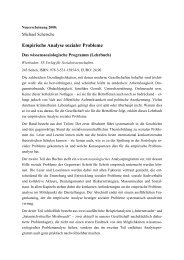Tätigkeitsbericht 2002/2003 - IGPP
Tätigkeitsbericht 2002/2003 - IGPP
Tätigkeitsbericht 2002/2003 - IGPP
Erfolgreiche ePaper selbst erstellen
Machen Sie aus Ihren PDF Publikationen ein blätterbares Flipbook mit unserer einzigartigen Google optimierten e-Paper Software.
Historical Studies, Archives and Library 57<br />
Roll (1976); Bonin (1976); Stevenson (1977); Targ<br />
& Puthoff (1977); L. E. Rhine (1978); Tyrrell (1978);<br />
Prokop & Wimmer (1987); v. Lucadou (1997).<br />
Bauer, Brunner<br />
2.4.5 Archiv<br />
Das Ziel des Institutsarchivs besteht in der Erfassung,<br />
Sicherung, Erschließung und Auswertung all<br />
jener Materialien, die für die historische und kulturelle<br />
Rezeptionsforschung der Psychical Research und Parapsychologie<br />
in Deutschland und Europa wie auch die<br />
Geschichte des Instituts selbst von zentraler Bedeutung<br />
sind. Darunter fällt insbesondere das wichtige<br />
Material, das aus der Eichhalde-Periode des Instituts<br />
(1950–1996) stammt und das mit der Tätigkeit und<br />
den Forschungsinteressen des Institutsgründers, Prof.<br />
Hans Bender (1907–1991), verknüpft ist. Ein wichtiger<br />
Bestandteil des Institutsarchivs sind Nachlässe von<br />
Forschern und anderen Personen, die für die Sozial-,<br />
Kultur- und Wissenschaftsgeschichte besonders der<br />
deutschsprachigen Parapsychologie von Interesse sind.<br />
Dieser Fundus an Materialien zur Historischen Parapsychologie<br />
und Rezeptionsforschung wird laufend erweitert<br />
(vgl. auch 2.4.2). Angesichts der Tatsache,<br />
dass das <strong>IGPP</strong> auf eine über 50jährige Forschungsund<br />
Beratungstradition zurückblicken kann, nimmt<br />
sein Archiv mit seinen Sammlungen im Rahmen der<br />
europäischen Wissenschaftslandschaft eine besondere<br />
Stellung ein.<br />
Bauer, Fischer, Schellinger<br />
Archivbestände und Archivtektonik<br />
Die Archivtektonik sowie die Bestandszahl des <strong>IGPP</strong>-<br />
Archivs konnten in den zurückliegenden Jahren sowohl<br />
erheblich ausdifferenziert als auch in bestimmten<br />
Teilen erweitert werden. Neben der Abgabe von<br />
Archivgut aus dem <strong>IGPP</strong> selbst (<strong>2002</strong>/<strong>2003</strong>: 34<br />
Akzessionsnummern) konnten die Bestände durch<br />
Ankäufe erweitert werden, z.B. durch die Übernahme<br />
eines Teils des Redaktionsarchivs des Magazins Esotera<br />
(Schriftgut und Bildmaterial) sowie durch den<br />
Ankauf einer speziellen Pressesammlung. Zu mehreren<br />
Beständen waren aufwendige Recherchen notwendig,<br />
um Klarheit über die Provenienz der Unterlagen<br />
zu erhalten. Es liegen inzwischen folgende<br />
größere und in sich ausdifferenzierte Bestandsgruppen<br />
vor: Fotografien, Tonträger, Filme, Objekte,<br />
Abgeschlossene Datenbanken, Arbeit des Instituts auf<br />
der Eichhalde (1950–1996), Arbeit des Instituts in<br />
der Wilhelmstraße (1996); Nachlässe – Teilnachlässe<br />
– Nachlasssplitter; Sammlungen; Wissenschaftliche<br />
Veröffentlichungen und Pressepublizistik.<br />
Erschließung<br />
Weitere Bestände konnten inzwischen abschließend erschlossen<br />
werden und sind durch unterschiedliche Findmittel<br />
für die Forschung nutzbar gemacht: Teilnachlass<br />
Gerda Walther (1897–1977); ungedruckte Manu-<br />
Roll (1976); Bonin (1976); Stevenson (1977); Targ<br />
& Puthoff (1977); L. E. Rhine (1978); Tyrrell (1978);<br />
Prokop & Wimmer (1987); v. Lucadou (1997).<br />
Bauer, Brunner<br />
2.4.5 Archives<br />
The Institute operates a research archive focusing on<br />
the registration, recording, analysis and evaluation of<br />
all those materials which are relevant for historical and<br />
cultural aspects of the reception of psychical research<br />
and parapsychology in Germany and Europe and for<br />
the history of the <strong>IGPP</strong> itself. Important archive collections<br />
are dealing primarily with the Eichhalde period<br />
of the <strong>IGPP</strong> (1950–1996), covering the activities<br />
and research interests of its founder, Prof. Hans Bender<br />
(1907–1991). Another important section of the<br />
<strong>IGPP</strong> archive relates to personal and professional files<br />
of researchers and other persons who are important<br />
for the social, cultural and scientific history of German<br />
parapsychology. The archive permanently enlarges its<br />
corpus of material related to the history of psychical<br />
research especially from the point of view of reception<br />
topics (see also 2.4.2). Given the fact, that the <strong>IGPP</strong><br />
looks back on more than fifty years of research and<br />
counseling, the archive and its collections are of special<br />
importance to the entire scientific scene in Europe.<br />
Bauer, Fischer, Schellinger<br />
Archive Groups and Arrangement of Archives<br />
Over the last years, the archival arrangement and<br />
the number of archival groups could be enlarged<br />
considerably. Some collections could also be added.<br />
Besides the delivery of records coming from the <strong>IGPP</strong><br />
itself, the archival records could be supplemented,<br />
for example by buying the editorial archives of the<br />
popular magazine Esotera, consisting mainly of papers<br />
and photographies, and a special collection of press<br />
clippings dealing with paranormal topics. For some<br />
of the archival groups detailed investigations were<br />
necessary to clear up the provenance of the records.<br />
Meanwhile the following larger archival groups, each<br />
differentiated, form the arrangement of archives. They<br />
consist of photographies, audio-visual recordings,<br />
films, objects, completed digital databases, the <strong>IGPP</strong>s<br />
work covering the “Eichhalde” period (1950–1996), the<br />
<strong>IGPP</strong> work since 1996ff. (“Wilhelmstraße”), personal<br />
papers and part personal papers; collections; scientific<br />
publications and publications from the popular press.<br />
Communication<br />
In the meantime, more archival groups could be finally<br />
communicated and prepared for research by different<br />
finding aids: a part of the personal papers (correspondence)<br />
of Gerda Walther (1897–1977); a collection of


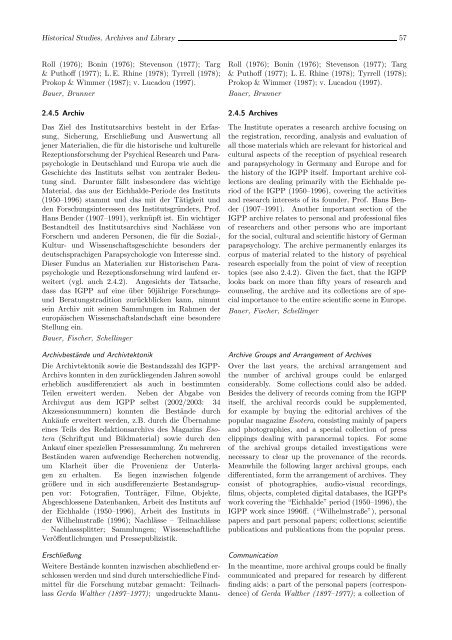
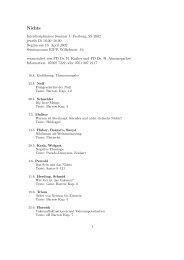
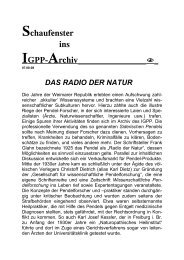
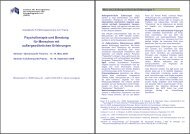
![Findliste Nachträge1 [pdf] - IGPP](https://img.yumpu.com/22552359/1/184x260/findliste-nachtrage1-pdf-igpp.jpg?quality=85)
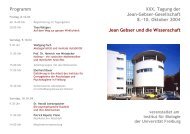
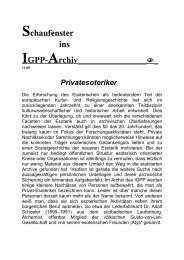
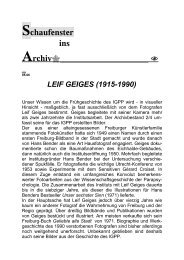
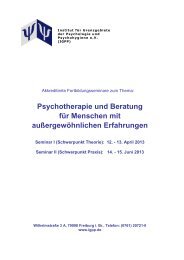
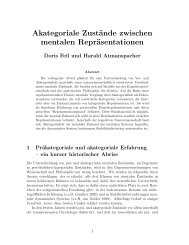
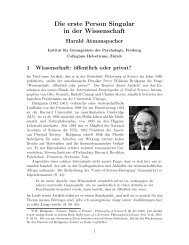
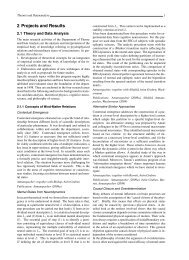
![Findliste [pdf] - IGPP](https://img.yumpu.com/22552265/1/190x245/findliste-pdf-igpp.jpg?quality=85)
